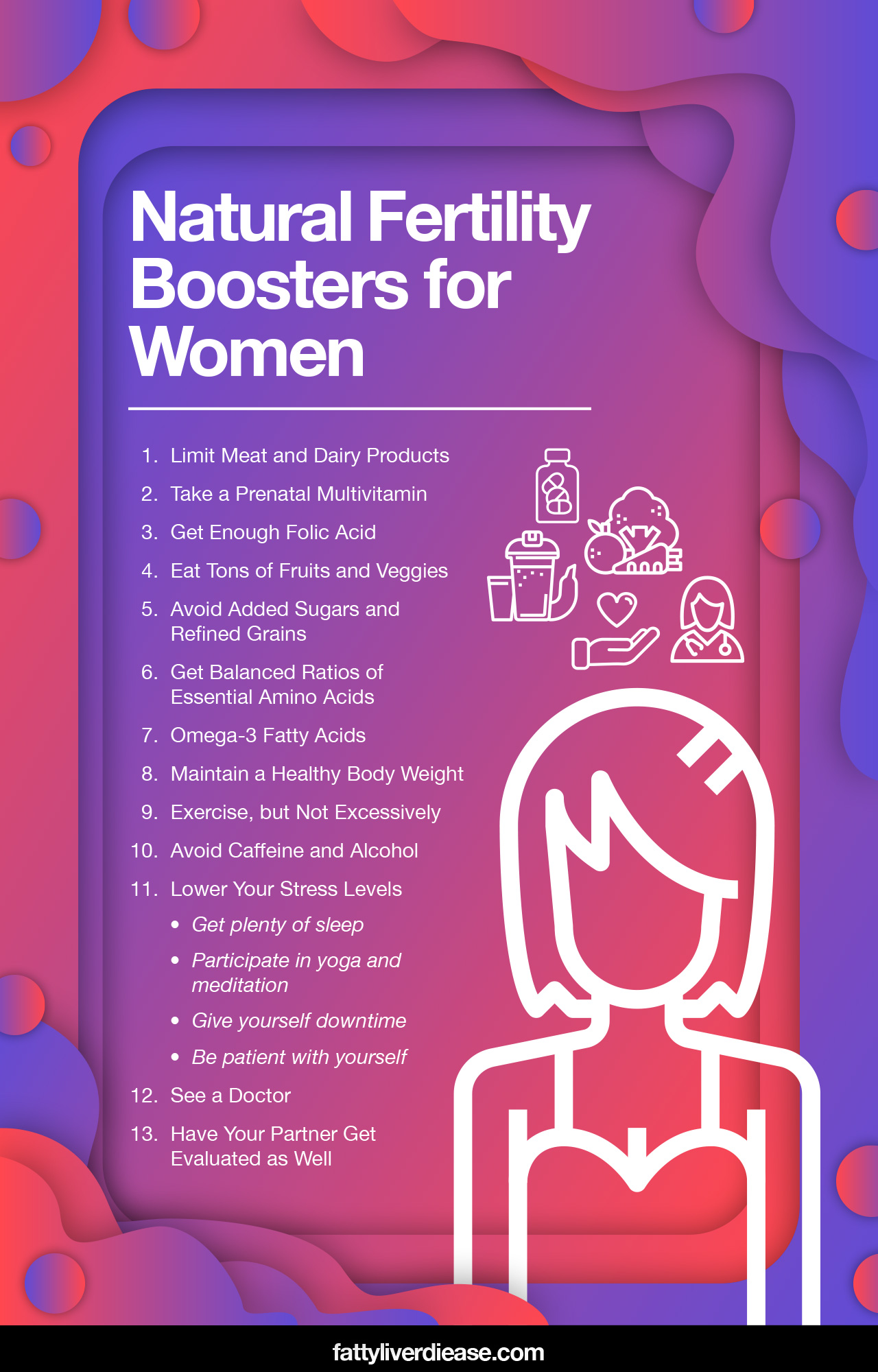Are you preparing to have a baby? If so, you may be wondering about natural fertility boosters and foods that increase fertility. If you’re looking for natural fertility info, you’ve come to the right place. Here we go through natural fertility boosters, including vitamins, foods, and lifestyle changes that you can make to increase your likelihood of conceiving. Keep reading to find out more!
What Exactly Is Fertility?
Fertility can be described as your chance of conceiving a baby with regular, unprotected sex. Before we go any further, it’s important to first point out that there are numerous factors that influence fertility. If you are on birth control, you must first stop birth control and allow your body to readjust to its normal hormone levels. For many women, it may take 3-6 months or longer to reacclimate to natural hormone levels and get pregnant. The timing of unprotected sex must also coincide with ovulation in your menstrual cycle. Keep in mind that there are many factors that influence the chances of conception. For young women in their 20’s and early 30’s, infertility is only diagnosed after about a year of baby-making efforts that have not resulted in pregnancy.
Natural Fertility Boosters for Women
Looking for strategies on how to boost fertility? Here are tips for increasing your natural fertility.
1. Limit Meat and Dairy Products
If you are coming off of birth control, limiting meat and dairy products may be particularly important. Because of the way that the meat and dairy industry deals with animals, a lot of meat and dairy products that we get in the grocery store are filled with growth hormones, antibiotics, and other compounds that may influence our own hormones.
Interestingly, meat may contain very high levels of stress hormones that we ingest when we enjoy a meat-based meal. Any kind of stress hormones or other hormones can influence our own natural balance of hormones. Especially when we are readjusting to our natural hormone levels after stopping birth control or hormonal contraceptives, it is critical not to introduce any more hormones that may mess with the natural balance of the endocrine system. Though meat and dairy products are often a significant contributor of protein in the diet, it is still possible to get optimal ratios of essential amino acids from other sources (see tip #6 below).
When you do eat meat and dairy products, try to consume organic, farm-raised products whenever possible, in order to reduce inflammation and hormone intake.
2. Take a Prenatal Multivitamin
Taking prenatal vitamins is always a good idea, simply because it can often be difficult to obtain all the vitamins you need from the foods you eat. Especially when it comes to reproductive health and pregnancy, you want to make sure that you fill in any gaps with a prenatal vitamin.
3. Get Enough Folic Acid
Folic acid is a B vitamin that is absolutely crucial to a healthy pregnancy. In particular, folic acid is important for encouraging the development of a healthy nervous system. Folic acid can be found in vegetables like kale, whole-grain bread, as well as in prenatal vitamins.
4. Eat Tons of Fruits and Veggies
Your fertility diet should include loads of fruits and vegetables. Fruits and vegetables are loaded down with antioxidant compounds including polyphenols, vitamins, and minerals. Fruits and vegetables fight against oxidative damage in cells which is a form of damage that can impede fertility and lower your chances of conceiving. Add lots of fruits and vegetables to your diet on a daily basis, like kale, broccoli, blueberries, raspberries, blackberries, spinach, and pomegranate.
5. Avoid Added Sugars and Refined Grains
Added sugars have been isolated from their original source and artificially added into packaged and processed products such as granola bars, sugary cereals, candy, cookies, and soft drinks. when we eat foods that are high in added sugars, these added sugars are immediately broken down into glucose in the digestive system and released into the bloodstream. Refined grains are treated similarly in the digestive system. Refined grains have undergone an industrial process that has removed the protein, fiber, and all parts of the grain that had any nutritional value. The remaining product is the simple starch that is quickly broken down into glucose and released into the bloodstream.
Eating too much added sugar and refined grains can cause blood sugar levels to be all over the place. This, in turn, causes hormone levels to go haywire, which may interfere with your likelihood of conceiving. To help rebalance your hormones, cut out refined grains and foods with added sugars. For example, steer clear of white bread, white pasta, white rice, cookies, cakes, doughnuts, candy, and soft drinks.
6. Get Balanced Ratios of Essential Amino Acids
Essential amino acids are regarded as the building blocks of protein. When we consume protein particles, the body breaks down protein into its individual amino acids. These amino acids are then absorbed in the intestines and shuttle throughout the body to be used in various biological mechanisms.
Essential amino acids are indispensable components of our diet, and we require optimal ratios of essential amino acids on a daily basis in order for all of our organ systems to function most effectively. So, what roles do essential amino acids play in the body? The body utilizes essential amino acids to fortify the immune system, synthesize muscle tissue, synthesize connective tissue and skin, build neurotransmitters, and produce enzymes and hormones. The role that essential amino acids play in hormone synthesis suggests that they are important for balancing hormones.
PCOS, or polycystic ovary syndrome, is a condition that causes females to have excessively high levels of male hormones, called androgens. This disrupts the natural hormone balance and often results in temporary infertility that is reversible with curing the condition. Dietary factors play a role in PCOS, including the consumption of essential amino acids. A pilot study published in the Indian Journal of Medical Research found that women with PCOS had significantly lower blood levels of essential amino acids, in comparison to the control group. Though this is an intriguing study, further research is required to determine whether directly supplementing with essential amino acids would be beneficial for PCOS and improve fertility. (1)
However, it can be asserted that consuming high-quality protein sources is important for supporting reproductive health. So, where can you get high-quality protein? As discussed above, animal sources of protein are a major source of optimal ratios of essential amino acids. However, because of the potential impact of meat and dairy products on hormones, ensuring that you get enough protein from other sources is vital. Fatty fish provides optimal ratios of essential amino acids. Plant-based proteins can also supply essential amino acids, though they must be combined throughout the day to make sure that the body obtains the optimal ratios that it needs. For example, eating whole grains, nuts, beans, and seeds throughout the day will help ensure that you’re getting the essential amino acids that you need.
7. Omega-3 Fatty Acids
Omega-3 fatty acids exhibit potent anti-inflammatory behavior that improves the function of nearly all organ systems. Eating an abundance of omega-3 fatty acids helps encourage the healthy functioning of the immune system and reproductive system. So, where can you get omega-3 fatty acids? These healthy polyunsaturated fats can be found in fatty fish like salmon or mackerel. Flaxseeds, chia seeds, and walnuts also afford lots of plant-based forms of omega-3 fatty acids.
8. Maintain a Healthy Body Weight
Maintaining a healthy body weight influences fertility. It is critical to be within the healthy body weight range for your height. Being either too thin or overweight can negatively impact your chances of getting pregnant.
If you are too thin, you have a body mass index (BMI) that is below the lower healthy limit for your height. When your BMI is too low, this means that there is not enough fat stored in your body. This may impact fertility by causing ovulation and your menstrual cycle to stop. When you don’t have enough body fat, the body interprets this as a sign of stress. The body doesn’t have enough resources for all body functions, so it stops the monthly menstrual cycle in order to conserve energy. If you are underweight and trying to conceive, meet with your physician and a registered dietitian about how to healthfully gain weight and put on enough body fat to support a menstrual cycle and pregnancy.
Similarly, being overweight can impact your chances of getting pregnant. Carrying excess body fat increases systemic inflammation, meddles with endocrine functions, and is often associated with a spike in male hormones called androgens. The androgens, more commonly known as testosterone, interfere with the normal balance of female hormones and decrease your chances of conceiving. There are several strategies you can use to encourage healthy weight loss. Try tracking your calories and make sure that your caloric intake is lower than the calories you burn. Eating a balanced diet, cutting out junk foods, and engaging in regular exercise can encourage a healthy body weight and reestablish hormonal balance.
9. Exercise, but Not Excessively
While exercise is important, there is a limit when you’re trying to conceive a baby. Intense athletic training may result in a very low body fat percentage, even if your BMI is within the normal range. Even if your overall body weight is normal, your body will still interpret a low body fat percentage as a sign of stress, or limited resources. Your body can detect when most of your energy and resources are spent on exercising, and as a result, it will make an effort to conserve energy by stopping your menstrual cycle and preventing conception.
If you are hitting the gym for 2 hours a day and you are trying to conceive, it’s time to cut back on working out. Allow your body some time and relaxation to recalibrate and store extra resources to support the growth of a baby.
10. Avoid Caffeine and Alcohol
Both caffeine and alcohol consumption can impact your chances of conceiving, even if you are otherwise in good health. Caffeine can stimulate the adrenal glands and throw off the careful balance of hormones in the endocrine system. Alcohol causes a significant amount of oxidative stress in every organ system in the body, including the liver, brain, and reproductive system.
When cells experience oxidative stress, this means they are experiencing damage inflicted by free radicals. When free radicals build up in cells, they interact with biochemical compounds and impede their function. As a result, oxidative stress in the reproductive system can lower the chances of conceiving. Stopping both caffeine and alcohol consumption allows your hormones to rebalance and cells to repair from oxidative damage.
11. Lower Your Stress Levels
Stress can cause all kinds of physiological changes in the body, including oxidative stress, inflammation, and a surge of stress hormones that interfere with the normal hormonal functions of the endocrine system.
In order to deal with oxidative stress and inflammation, the body requires all of the resources it has to soothe the inflammatory reaction, quell oxidative stress, and restore hormonal balance. There are things you can do to support a healthier response and allow your body to return to baseline.
- Get plenty of sleep. It’s no secret that sleep deprivation worsens stress, oxidative stress, and inflammation. Figure out a bedtime routine that helps you manage your anxiety and drift off to sleep. Maybe this means reading a chapter of your favorite book, engaging in meditation, or listening to bedtime stories. Or, it might mean limiting screen time and listening to your favorite relaxing music.
- Participate in yoga and meditation. Both yoga and meditation have been shown to significantly lower stress levels. Yoga and meditation train and re-center the mind, removing your focus from anxious thoughts and redirecting focus towards the present moment. Find a yoga class or a meditation app that you really enjoy. Set reminders on your phone to engage in consistent and routine meditative practice.
- Give yourself downtime. Work and school are important, but so are family and friends. If you find yourself craving a low-key evening with your loved ones, make it happen. Being around supportive people and socializing helps reduce anxiety and lower stress hormones.
- Be patient with yourself. Stressing out about how stressed you are, ultimately backfires. Instead, be patient with your mind and body. Take proactive steps towards decreasing stress but allow yourself time and space to heal and recover.
Lowering your stress levels may have an important impact on your fertility, and this claim is even backed by scientific research. A publication in Dialogues in Clinical Neuroscience provides evidence of a correlation between higher stress levels and infertility. (2)
12. When to See a Doctor
Your reproductive health is important, so it’s always a good idea to seek your doctor’s advice when trying to conceive. He or she will have helpful recommendations for prenatal vitamins and will also be able to evaluate whether you have an underlying medical condition that is causing infertility, such as polycystic ovary syndrome (PCOS) or endometriosis.
13. Have Your Partner Get Evaluated as Well
If you’re having trouble conceiving, it’s important to consider that your partner may have a fertility issue. Sometimes it’s necessary to go down all possible avenues in order to determine the cause of the delay in conceiving. Visit a fertility specialist with your partner, and undergo any necessary testing, such as measuring sperm count. Identifying the issue is the key to solving it.
What You Need to Know About Fertility Boosters: Conclusion
In order to promote your natural fertility, you don’t need to undergo a drastic fertility cleanse. Instead, optimizing fertility is all about being in balance, with food, lifestyle, and hormones all operating in sync to promote the ideal environment for a growing baby.

References























